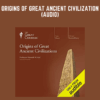Origins of Great Ancient Civilization (Audio) – Kenneth W. Harl, Ph.D
Original price was: $89.00.$29.00Current price is: $29.00.
In StockOrigins of Great Ancient Civilizations offers these and other insights in a fast-paced introduction that will give you a new appreciation of our own roots and a rock-solid foundation for deeper exploration.
Description
Accelerate your learning with the Origins of Great Ancient Civilization (Audio) - Kenneth W. Harl, Ph.D course, priced at just Original price was: $89.00.$29.00Current price is: $29.00. on ESYSGB.com! Explore our extensive catalog of over 60,000 downloadable digital courses across Spirituality and Religion. Experience flexible, self-paced learning from experts and save over 80%. Empower your future today!
Salepage link: At HERE. Archive: https://archive.is/wip/1vrfR
Buy now $29 $89, Origins of Great Ancient Civilization (Audio) – Kenneth W. Harl, Ph.D Course.
Course Overview
The ancient civilizations of the Near East can seem remote. For many of us, places such as Mesopotamia or the Indus valley … or the Hittite or Assyrian peoples … or rulers such as Sargon, Hammurabi, and Darius … are part of a long-dead antiquity, so shrouded with dust that we might be tempted to skip over them entirely, preferring to race forward along history’s timeline in search of the riches we know will be found in our studies of Greece and Rome.
That very remoteness, and our willingness to shunt aside these great civilizations, should be reason enough to study them, according to Professor Kenneth W. Harl. And remoteness, he emphasizes, is far from the only reason that demands our attention to the ancient cultures visited in Origins of Great Ancient Civilizations.
These civilizations “act as the cultural basis for many of the civilizations that will emerge on the Eurasian landmass and will dictate the destinies of many of the people living today on the globe.
“Mesopotamia,” he says, citing the ancient name for Iraq, the earliest civilization we know of, “perhaps more than any other civilization we shall look at, will really set the basis for what a civilization should be; that is, it should be urban-based; it should be literate; it should be based on intensive agriculture; and it also will depend very heavily on trade—not just local and regional markets, but long-distance trade.”
Another example of the contributions made by these civilizations, of course, is in the concept of a “transcendent, monotheistic God.
“How that notion comes about among the Hebrews and how it is transmitted to later generations … is perhaps one of the most important, if not the all-important achievement—certainly for Western civilizations—coming out of these great traditions.
“Finally, I think it’s important for all of us to understand the origins of these great traditions that come out of the Near East—or, as many would say today, the Middle East. They do stand behind the traditions of classical Greece. The Greeks themselves acknowledged their great debt to these older civilizations.”
A Unique Course Offering and an Introduction to Even Greater Riches
In adding this course to his long list of popular appearances for The Teaching Company—which include Rome and the Barbarians, The Era of the Crusades, and The Vikings, among others—Professor Harl has enabled us to offer lovers of history a lecture series unlike anything else now available. For these dozen lectures cover many civilizations that may only receive a few lines of cursory discussion in the average textbook on Western civilization. Moreover, they also serve as a superb introduction to the many courses we offer on the ancient world and the later civilizations, such as Greece and Rome, for which those included here provide the essential foundations.
Professor Harl begins during the Bronze Age and the emergence of urban-based literate civilizations and carries the story forward until the demise of Persia’s great empire at the hands of the Greeks, who embraced many of the achievements of these Near East civilizations but clearly represented a different kind of civilization, built on different institutions.
Along the way, he examines advances such as the invention and evolution of writing; the development of vast empires dependent not only on military might but on laws and administration; the growth of trade; and the contributions of the Hebrews to the religious and ethical future of Western civilization.
Moreover, he dispels the notion that beneath that layer of antique dust lies only more dust. Time and again, he sweeps that top layer aside to reveal one fascinating insight after another, deepening our understanding in ways that not only reanimate these civilizations, but also enhance our own sense of the serendipitous ways history reveals itself.
You’ll learn, for example, that the civilization of the Indus Valley, in many ways the cradle of later Indian civilization, was not discovered and excavated until the 1920s. That’s when officials of the British railway system being built in Pakistan, curious about the source of the glazed firebricks local workers were using to lay down the tracks, learned their astonishing origin. Ironically, the Indus civilization remains largely unknown because scholars have still not been successful in translating the writing left behind.
Or take the Nile and the fabled fertility of the lands that border its banks, made possible by the deposits of silt left by the floods that come with such clockwork predictability.
Though many people might take the Nile’s agricultural riches as a given, Professor Harl reveals that they are a recent phenomenon. Until around 5,000 B.C., when the drying Sahara assumed its present guise and pushed the river to its current course, the Nile was dense and overgrown marshland, rich in fish and fowl but not at all suitable for farming.
With each civilization he presents, Professor Harl gives us something fresh to contemplate.
- For example, the word “cuneiform” comes from the Latin cuneas, or wedge, and signifies not the name of the language used by the ancient Sumerians in inventing writing, but its form—the wedge-shaped characters that are easiest to create when writing in wet clay with a stylus.
- The legal code named for the Babylonian King Hammurabi—often remembered for its “eye-for-an-eye” severity in dealing with crime—was, in fact, exceptionally sophisticated. As Professor Harl explains, most of it dealt not with matters of crime and punishment, but with complex civil issues that included divorce, inheritance, property, contracts, and business compensation.
- Lions were once native to the Near East. They no longer are because of the massive lion hunts engaged in for sport by the kings of Assyria.
- The ancient Egyptians were passionate about cleanliness and shaved their heads for sanitary purposes. Nevertheless, because their gods were depicted as having beards—and a pharaoh is a god—all pharaohs wore fake beards, including Queen Hatshepsut, who reigned for almost three decades in the early 15th century B.C.
Origins of Great Ancient Civilizations offers these and other insights in a fast-paced introduction that will give you a new appreciation of our own roots and a rock-solid foundation for deeper exploration.
12 Lectures
Average 31 minutes each
1Cradles of Civilization
The opening lecture introduces the earliest civilizations of the Tigris-Euphrates, Nile, and Indus River valleys, which emerge c. 3500–3000 B.C. from Neolithic villages.
2First Cities of Sumer
We explore the economic, social, and religious life of the Sumerians, whose mastery of writing and long-distance trade make them the progenitors of the urban civilization of the ancient Near East.
3Mesopotamian Kings and Scribes
A look at three classes of people—kings, scribes, and soldiers—illuminates the creation of wider political institutions in ancient Mesopotamia, from the regional kingdoms to the territorial empires of the early and middle Bronze Age.
4Hammurabi’s Babylon
We end our survey of Mesopotamian civilization in the Bronze Age with an examination of the career and kingdom of Hammurabi, King of Babylon, who establishes the cultural underpinnings of Mesopotamian civilization thereafter.
5Egypt in the Pyramid Age
We begin three lectures on Egypt with a focus on the so-called early dynastic period and the Old Kingdom, beginning with a look at some of the basic features of early Egyptian civilization and the unique characteristics of the Nile.
6The Middle Kingdom
This lecture examines a key period of Egyptian history, which is roughly contemporaneous with the Babylon of Hammurabi, during which Egypt for the first time expands its horizons beyond its own frontiers.
7Imperial Egypt
Egypt’s monarchy comes to play the dominant role in the Near East until the empire comes to an end with attacks associated with the so-called “Sea Peoples”—invaders coming out of both Libya and the Aegean world.
8New Peoples of the Bronze Age
We complete our discussion of the Bronze Age with a look at three areas influenced by the early river valley civilizations: the region known as the Levant, the area that is today Asiatic Turkey, and the world of the Aegean.
9The Collapse of the Bronze Age
The great empires of the late Bronze Age fall in the wake of migrations and barbarian invasions usually associated with the advent of iron technology. Though this has been explained as the result of natural disasters, the imperial order did not collapse so much as fragment.
10From Hebrews to Jews
This lecture deals with the evolution of a group of Canaanite speakers to a people with a monotheistic faith attached not to a particular place, but to one’s perceptions, ethical beliefs, and worship of a transcendent God.
11Imperial Assyria
Despite their remarkable reputation for ferocity, the Assyrians do more than forge the first imperial order since the late Bronze Age; they set down many of the foundations upon which the Persians will build their far more successful and larger empire.
12The Persian Empire
We conclude the course with a look at an empire that may have had, at its peak, as many as 40 million subjects, and which, in its imperial organization, is perhaps the best-ordered until the age of Rome.
Get Origins of Great Ancient Civilization (Audio) – Kenneth W. Harl, Ph.D, Only Price $29
Tag: Origins of Great Ancient Civilization (Audio) – Kenneth W. Harl, Ph.D Download, Origins of Great Ancient Civilization (Audio) – Kenneth W. Harl, Ph.D review, Origins of Great Ancient Civilization (Audio) – Kenneth W. Harl, Ph.D Discount, great ancient civilization, great ancient civilizations, iran was home to this great ancient civilization, great ancient civilizations in africa, four great ancient civilizations.
Build a robust future with the Origins of Great Ancient Civilization (Audio) - Kenneth W. Harl, Ph.D course at ESYSGB.com! Gain lifetime access to high-impact digital content, meticulously designed to boost your career and personal growth.
- Lifetime Access: Permanent and unlimited access to your purchased courses.
- Exceptional Savings: Enjoy discounts of up to 80% off original prices.
- Secure Payments: Your transactions are fully protected and safe.
- Practical Knowledge: Acquire actionable skills for immediate application.
- Instant Availability: Start learning right after completing your purchase.
- Cross-Device Access: Study seamlessly on any desktop, tablet, or mobile device.
Unlock your potential with ESYSGB.com!
Additional information
| Total size | |
|---|---|
| Language | |
| Author |
Only logged in customers who have purchased this product may leave a review.



![Origins of Great Ancient Civilization (Audio) - Kenneth W. Harl, Ph.D - eSys[GroupBuy] Origins of Great Ancient Civilization (Audio) - Kenneth W. Harl](https://esysgb.com/wp-content/uploads/2023/10/Origins-of-Great-Ancient-Civilization-Audio-Kenneth-W_-Harl-Ph_D.png)



![Quantum Leap E - Course - Aura Colors - eSys[GroupBuy] Quantum Leap E - Course - Aura Colors](https://esysgb.com/wp-content/uploads/2023/07/Quantum-leap-E-course.jpg)
![Part 2: Ritualising Your Life - Dalian Adofo - eSys[GroupBuy] Part 2: Ritualising Your Life - Dalian Adofo](https://esysgb.com/wp-content/uploads/2023/10/part-2-riotulising-your-life.jpg)
![Origins of Great Ancient Civilization (Video) - Kenneth W. Harl, Ph.D - eSys[GroupBuy] Origins of Great Ancient Civilization (Video) - Kenneth W. Harl](https://esysgb.com/wp-content/uploads/2023/10/Origins-of-Great-Ancient-Civilization-Video-Kenneth-W_-Harl-Ph_D.png)

Reviews
There are no reviews yet.